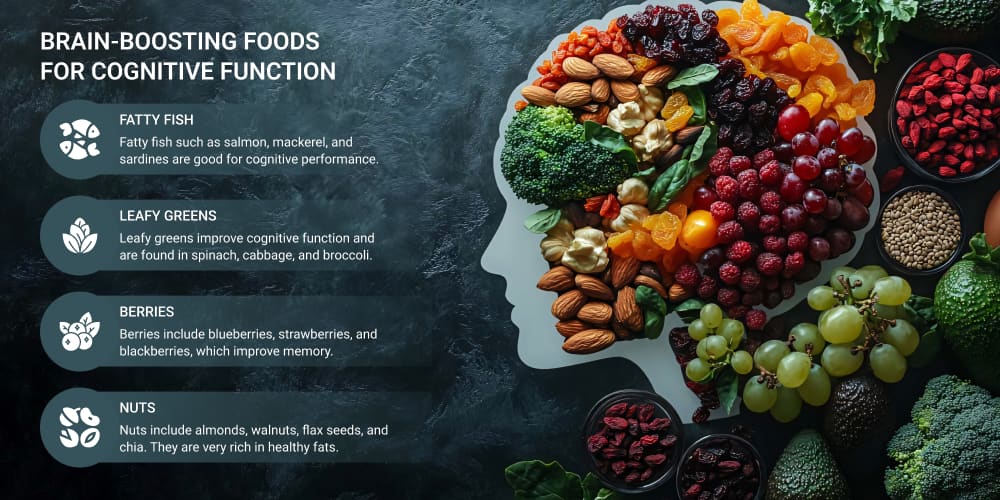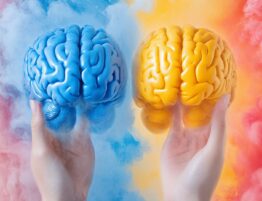Recent research has shown us better ways to care for our health. When our brain functions well, we can think and operate properly. Brain plasticity directly depends on environmental influences and other factors. Exercise and proper nutrition play an essential role in maintaining health. For neuroplasticity, a healthy diet is key to a good outcome. Brain plasticity enables learning, memory retention, and cognitive flexibility.
Consuming a healthy diet, which is rich in antioxidants and B vitamins, is beneficial. The brain receives all the necessary nutrients and functions well. As a result, a person enjoys improved memory, enhanced learning capacity, and better cognitive abilities. Maintaining a good diet is very important for brain health. A person avoids oxidative stress and the possibility of neurodegenerative diseases. Adding physical activity and healthy sleep to the diet will strengthen health and immunity. Consuming essential nutrients and vitamins helps maintain optimal health.
How Dietary Patterns Affect Neuroplasticity
LoneStarNeurology offers high-quality medical care for people with neurological conditions. Neurodegenerative diseases and psychological conditions can be managed with high-quality treatment. To maintain neuroplasticity, healthy food and diet play an important role. The body needs quality nutrients to maintain optimal health. Nutritious food helps maintain brain plasticity and cognitive abilities. Consuming a balanced diet consistently increases brain plasticity. Poor nutrition, on the contrary, worsens cognitive function and overall health.
A diet that contains healthy fats, whole grains, and amino acids is beneficial. They provide the body with all the necessary nutrients. Brain cells are nourished and can regenerate more effectively. This can lead to fewer illnesses and better overall health. Here are the types of foods that are good for neuroplasticity:
- Healthy fats. Omega-3 and other healthy fats are beneficial for the entire body. They are found in seeds, fish, and avocados and are very useful. Healthy fats improve neuronal growth and reduce any inflammation in the body.
- Proteins. Proteins play a key role in the production of the neurotransmitters dopamine and serotonin. Proteins and amino acids influence mood regulation and can help manage anxiety and depression. They improve cognitive ability and overall physical well-being.
- Whole grains. The proper dietary patterns include whole grains and whole grain products. They are high in carbohydrates and provide good glucose levels. They help to improve cognitive abilities and the health and functioning of the body.
Eating healthy foods regularly plays a vital role in cognitive performance. A consistent schedule ensures that nutrients are delivered to the brain. For cognitive function, reducing sugar and increasing nutrients is beneficial. A person can think well, learn, and have a sharp mind. A good dietary pattern is an integral part of the health of the whole body.
The Role of Micronutrients in Brain Health
Consulting with a healthcare provider can help address specific neurological concerns. Micronutrients play an important role in supporting brain plasticity and cognitive abilities. They play an essential role in the overall health of the nervous system and the brain. Including these in your diet will support your overall well-being and health. Deficiencies in these nutrients can significantly impair bodily functions. Here are the main micronutrients and their main characteristics:
- B vitamins. B vitamins include vitamins B6, B9, and B12, which are essential for the synthesis of neurotransmitters and for the protection of cognitive abilities. Disruption of these functions and a decrease in vitamins will impair memory and lead to brain fog. B vitamins are found in eggs, legumes, leafy greens, and meat.
- Magnesium. Magnesium is a micronutrient that supports synaptic plasticity. Magnesium helps manage stress and can reduce brain fog. Magnesium deficiency will lead to poor health and stress. It is found in nuts, whole grains, and dark chocolate, which are beneficial.
- Antioxidants. Antioxidants are found in vitamin C, vitamin E, and polyphenols. They protect brain cells that affect brain health. They reduce oxidative damage and improve neuronal repair. Antioxidants are found in berries, citrus fruits, nuts, seeds, and green tea.
Deficiencies in these essential elements impair brain function and overall health. Lack of vitamins and minerals impairs memory and learning and increases inflammation. Micronutrient deficiencies contribute to brain fog, mood disorders, and anxiety.
Brain-Boosting Foods for Cognitive Function
Healthy food plays an important role in brain stimulation and cognitive function. A diet rich in specific nutrients can help improve memory. They support plasticity and help form new neural connections. Here are the top foods to stimulate the brain:
- Fatty fish. Fatty fish such as salmon, mackerel, and sardines are good for cognitive performance. They play an important role in memory and learning and reduce brain inflammation.
- Leafy greens. Leafy greens improve cognitive function and are found in spinach, cabbage, and broccoli. B vitamins and antioxidants protect brain cells from oxidative stress.
- Berries. Berries include blueberries, strawberries, and blackberries, which improve memory and brain plasticity. These berries help fight cognitive decline and improve memory.
- Nuts. Nuts include almonds, walnuts, flax seeds, and chia. They are very rich in healthy fats, vitamins E, and magnesium. Nuts help maintain memory function and cognitive abilities.
Healthy foods improve brain health and memory, which is essential. They reduce oxidative stress, protect neurons, and improve concentration. These foods enhance long-term health and reduce the risk of neurodegenerative diseases.
The Impact of Omega-3 Fatty Acids on Neuroplasticity
Most people want to improve their health, and following a nutritious diet is a great place to start. Omega-3 fatty acids play a crucial role in brain function to support neuroplasticity. They improve cognitive ability and plasticity and reorganize neural connections. Here’s how omega-3s support these functions:
- Omega-3s help maintain and improve synaptic function, which provides flexibility for signal transmission. Synaptic function supports the formation of new synapses and strengthens neural connections.
- Omega-3 fatty acids effectively stimulate neurogenesis and the creation of new cells. In some areas of the brain, this function is essential for memory and learning. Repairing damaged neurons helps prevent cognitive decline.
- Omega-3 helps reduce inflammation and protects brain cells. Reducing neuroinflammation helps delay the onset of neurodegenerative diseases. Antioxidants protect brain cells from oxidative stress and damage.
The scientific evidence of omega-3s for cognitive performance is remarkable. It helps explain how omega-3s affect the health and functioning of the entire body. A study published in the Journal of Alzheimer’s Disease showed how omega 3 helps preserve memory and cognitive abilities. The article “Frontiers in Aging Neuroscience” says that omega-3 supplementation improves synaptic plasticity. This can enhance learning ability and help prevent cognitive function.
Micronutrients vs. Macronutrients: What’s Best for Brain Health?
Macronutrients and micronutrients are essential for good brain function. Together, they provide all the necessary vitamins, proteins, fats, and carbohydrates. They play a key role in the health and functioning of the entire body. They play a crucial role in reducing oxidative stress and various types of inflammation. Here is their main comparison and difference:
| Micronutrients | Macronutrients |
|
|
A balanced intake of these nutrients is essential for optimal health. Combining proteins with antioxidants and omega-3 fatty acids is a beneficial dietary practice. They play a crucial role in brain function and cognitive abilities. They protect neurons and are beneficial for human health.
Practical Tips for Improving Cognitive Function Through Diet
Proper dietary patterns are integral to cognitive performance and health. Diet improves memory, concentration, and plasticity, which is essential. Establishing consistent eating habits and making mindful food choices will help you maintain brain health. Here are key dietary recommendations:
- Always start your day with breakfast to stimulate your brain. You can choose something with avocado, which contains fats, protein, and fiber.
- To improve cognitive function, add more omega-3s to your diet. This can help improve synaptic function and memory. Eat fatty fish, sprinkle it with flax seeds, and use olive oil.
- Choose whole grain breads and legumes and fiber-rich fruits. You will maintain energy levels and ensure long-term brain health. Eat walnuts and dark chocolate as a snack.
- Always consume enough water to reduce fatigue and impaired concentration. Add citrus fruits, lemon, mint, or cucumber to your water for an energy boost.
- Establish a daily routine for eating. Eat balanced meals every 3-4 hours. Plan your meals in advance and take the necessary vitamins contained in the food.













Please, leave your review
Write a comment: